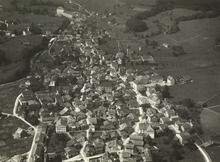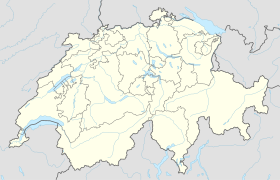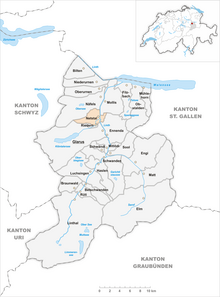Netstal
| Netstal | ||
|---|---|---|
| State : |
|
|
| Canton : |
|
|
| District : | No district division | |
| Political community : | Glarus | |
| Postal code : | 8754 | |
| former BFS no. : | 1620 | |
| Coordinates : | 722 889 / 213684 | |
| Height : | 464 m above sea level M. | |
| Area : | 10.63 km² | |
| Residents: | 2875 (December 31, 2010) | |
| Population density : | 270 inhabitants per km² | |
|
Netstal from the northeast |
||
| map | ||
|
|
||

Netstal is a village in the municipality of Glarus in the canton of Glarus in Switzerland . The village has around 3000 inhabitants.
It was merged with the communities of Ennenda , Glarus and Riedern to form the new community of Glarus on January 1, 2011 as part of the Glarus community reform .
geography
The place Netstal is 458 m above sea level. M. The municipality is only populated on the western (left) side of the main valley. Parts of the village are on both sides of the Löntsch coming from the Klöntal . The village image is characterized by four hills that stem from a prehistoric landslide from the Glärnisch .
history
The oldest surviving documentary mention of Netstal dates back to 1289. It is unclear whether the name is interpreted as the stable of the farmer Net , or whether it is derived from the Old High German word “Netz” (meaning source ) or whether it has any other origin.
In the Tagwen Netstal, the settlements of Leuzingen, Löntschen and part of the disappeared Tagwen Turserron opened up by the 16th century. Until around 1900 the Klöntal was also considered to belong to the municipality.
The village suffered great damage in the course of the 2nd coalition war in 1799. A Russian cannonball and the inscription 1799 on the Sternen restaurant are a reminder of the fierce fighting between the French and Russians in and around Netstal.
coat of arms
In 1421 one of the richest confederates of his time, former Landammann Mathias Netstaler, founded a chapel. Even today, the municipal coat of arms reminds of that of the former Netstaler family. Instead of one, however, it now has three stars, which symbolize the three hamlets attached to the community.
religion
Netstal was part of the parish of Glarus. It was not until 1777 that the municipality replaced the right to vote. In 1876 Netstal was raised to the status of an independent Catholic parish. The current Catholic church was built by Otto Linder in 1933–1934 and consecrated in 1935. Between 1624 and 1837 the Catholic Landsgemeinde met 77 times in Erlen, on the border with Näfels, and the Catholic Council of the State of Glarus until 1742 in the still existing Gasthaus Raben , then until 1798 in the current restaurant Zum alten Rathaus .
In 1697 the first Protestant church was built on the site of the current cemetery. In 1810/13 the church members were forced to build what is now the church.
economy
In the 16th century there were around 500 souls in the village population. It was severely decimated by the appearance of the plague in 1611 and 1629. Rising prices and famine forced the Netstaler to serve in foreign armies and to emigrate all over the world. After all, hydropower encouraged the emergence of businesses in the 16th century. The first mill appears in the written sources in 1548, and a Zigermühle for the first time in 1651. Heinrich Weber-Walcher (1654–1722) was the first to operate a paper mill on the lower Dorfbach. During this time, firewood and construction wood from the Klöntal were increasingly traded. An extensive straw hat trade developed from the wad making, which was practiced by Netstalers in France during the summer. During the Helvetic Republic, Netstal was assigned to the Glarus district.
Industrialization in the 19th century particularly affected textiles. In 1857 the later Netstal-Maschinen AG was founded , today with its headquarters in Näfels, and in 1859 the connection to the railway network with the opening of the Weesen – Linthal railway line . Between 1820 and 1875, many Netstal specialists, especially cheese makers, emigrated to Russia.
Around the turn of the 20th century there were factories for paper, metal and plastic goods ( Stöckli , since 1878), for lime ( Chalchi / Kalkfabrik Netstal KFN , since 1900) and precision gears ( Sauter, Bachmann AG , since 1922). Many manufacturers' villas are witnesses to this development. The population of Netstal almost doubled between 1799 and 1870 (increase from 1350 to 2600 people). A museum has been documenting (since 1981), among other things, the construction of the Löntschwerk (1905–1908) with the dam in the Klöntal. From 1862 until its completion, ice had been extracted there on a large scale.
schools
A classroom was set up in a farmhouse for the first time in 1725 and the first schoolmaster was elected in 1737. On June 6, 1877, the Netstaler inaugurated a community-owned school building, to which a secondary school building was attached in 1936 and a primary school building in 1959. A kindergarten has also existed since 1867.
Monuments
- The Stählihaus , one of the few frame buildings in the canton, is striking . The house was built in 1728.
- The legendary Glarus leader of the Battle of Näfels , Mathias Ambühl, immortalized a plaque at the Ambühlhaus .
- On December 15, 1941, a mine throwing accident occurred below Netstal in which four soldiers from the headquarters company of the cantonal fusilier battalion 85 lost their lives. A memorial stone on which an honorary company from Glarus lays a wreath every year on the Näfelser Fahrt commemorates this tragedy .
- The Schlattstein , a large boulder above the village , is a natural monument .
Personalities
- Johann Melchior Kubli (1750–1835), politician
- Rudolf Leuzinger (1826–1896), cartographer
- Ludwig Hohl (1904–1980), writer
- Fridolin Beeler (1921–1943), traitor sentenced to death
- Marcel Schwander (1929–2010), journalist, writer and translator
Web links
- Karin Marti-Weissenbach: Netstal. In: Historical Lexicon of Switzerland .
Individual evidence
- ↑ www.sauterbachmann.ch , History of Sauter Bachmann AG








